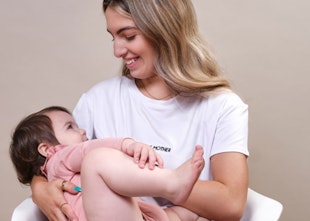Car seats are designed to get children from A to B both comfortably and safely. Regardless of the type of car or the length of the journey, they are legally required for children travelling by car up to the age of twelve or until they are 135cm in height.
Buying a car seat is one of the most important purchases you will make for your child, and you must take your time researching and choosing the right one. In the event of a road traffic collision, even a minor crash, you want to be assured you have taken every necessary precaution to protect your child's fragile bones and vulnerable organs that are constantly developing.
Child restraints come in a wide variety of shapes and sizes, with many brands on the market to choose from, and they all come with different levels of quality and safety features. It can be a minefield to any parent, especially first-time parents, so we have put some tips together to help you choose the right car seat for you and your growing family.
Know the basics
- First and foremost, all child and infant car seats must have a 5-point harness; it is non-negotiable.
- For infants, look for a car seat with an insert to support their head. Using additional pillows for comfort can be dangerous in the event of an accident.
- Side impact protection with deep walls at the side of the child or baby's head is essential; it can help protect their head, neck and spine.
- Double-check the car seat is compatible with your car, as some car seats are not suitable for some vehicles.
What are groups?
Groups are a system of categories defined by Irish car seat legislation. The grouping system makes it easier for parents to match a car seat based on the child's weight and height. For example, if a child weighs 11kgs, they must be in a rear-facing car seat and a Group 0 car seat.

What is the safest car seat?
Rear-facing car seats are five times safer than forward-facing car seats, and it is recommended to keep your child rear-facing beyond infancy until they are at least four years of age. Rear-facing seats absorb most of the crash force while supporting the head, neck and spine of a child in comparison to those travelling in a forward-facing car seat. In the event of a head-on collision, a child's head can be thrown forward, causing significant head and spine injuries.
Must-have accessories
ISOFIX is a nifty car seat accessory and makes life a whole lot easier when it comes to installing car seats, especially if you will be taking it in and out on a regular basis. It is a universal child safety seat system used across the world and can be found in most, if not all, up-to-date cars. It allows you to automatically lock your child's car seat or base of a chair onto two permanent mental clips embedded into the seat of your vehicle. While using ISOFIX, there is no need to be faffing about with the seatbelt to secure a car seat in place. With the product there is minimal risk of incorrect installation, it's quick and easy to use, and has a permanent connection.
Installation
If and when you buy a car seat that has passed all EU regulations, and from a reputable supplier, there should be an option to get your car seat fitted correctly. If not, the Road Safety Authority offers a free Check It Fits service at various locations across the country. It takes only 10-15 minutes, and no appointments are necessary.
Be aware
Buying a second-hand car seat comes with many risks. Firstly, there may be wear and tear that could potentially affect the safety of your child. For example, cleaning car seats with harsh chemicals can make the fabric deteriorate. How do you know the seller hasn't scrubbed the car seat within an inch of its life?
Secondly, the seat may no longer comply with the latest safety guidelines. Child and baby seats regularly go through safety tests, and the one you choose may not be up to standard, or it may have been recalled. Also, it might be missing the original instruction manual, showing you how to install the car seat correctly.
Do you know its history? That might sound silly to some but unless you know beyond a shadow of a doubt that the car seat has never been in a collision, do not buy it. Car seats involved in an accident should never be used again, and some manufacturers recommend replacing restraints even after a minor crash.
And finally, some car seats have an expiration date, and plastic can weaken over time. Never use a car seat that doesn't have a label stating the date of manufacture and the model number.








